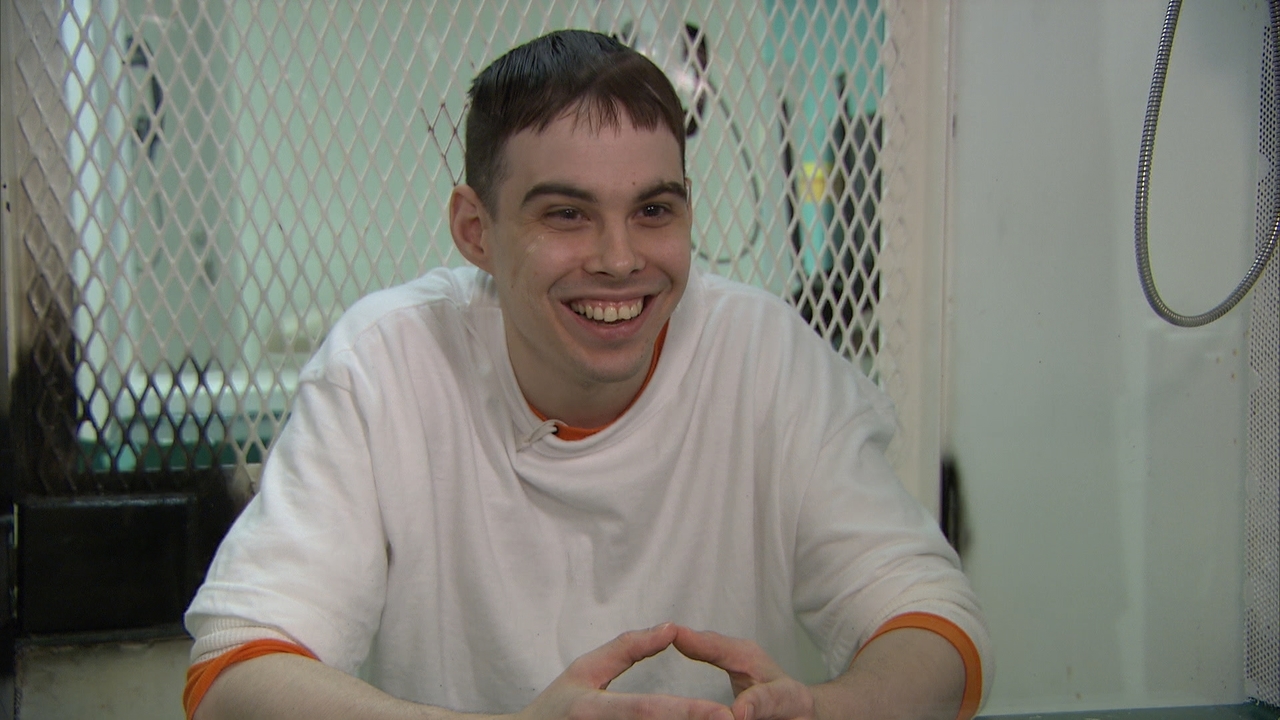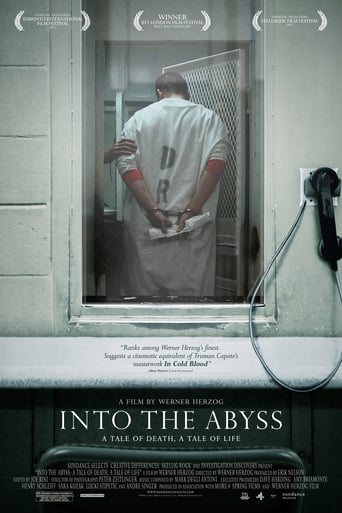ManiakJiggy
This is How Movies Should Be Made
NekoHomey
Purely Joyful Movie!
Ameriatch
One of the best films i have seen
Myron Clemons
A film of deceptively outspoken contemporary relevance, this is cinema at its most alert, alarming and alive.
De-illusionist
I'd better to say I might be biased.I'm not "Hey,this is killer!"person.
And here,Herzog met MIchael,28 yrs old kid,just lost his father 2 weeks before,
and facing imminent execution.Some people found his laugh ,like "Sick"or "Psychopath".No,It was,Human's defense system.
Even cats purr when he/she is dying.
I've read one of recent executed inmate was so Hyper the morning he will be executed.(RIP..)
People sometime laugh,depends of individual,
when he/she knows his/her heart will stop by some chemical injected.
It's not they're Psychopath,but just showing the are human.
(Translated review I wrote for Amazon.jp years ago,and added new info)
supatube
When a documentary has its own opinion it tends to fight with ones natural ability to think for oneself. And no other documentary film maker does this better than Werner Hertzog. Forcing you to listen to his opinion - and why should I care what Hertzogs opinion is? So is the film terrible? Not necessarily, its well made, all the plot points are there, it comes to an end but all the while infuriating me by telling me from the beginning 'this is how you should feel about the death penalty'. Naturally I take up defense but this is not necessarily how i feel about the topic at hand, I am just naturally inclined to stand up to force. And he tried to force me to agree with him. Agree or not, I cant respect this film, as it did not respect me as a free thinker. It tried to downplay a criminals actions and their role in retribution. It tried to make me feel something for people I couldn't. It tried to make a point in the most arrogant fashion. It even had glimpses of superiority, as the film maker is so much smarter than the subjects he is filming. Give me a break. I should have learnt my lesson from that bear documentary, that wasn't bad at all except for the part where he couldn't let us listen to the tape of the man being mauled by a bear (he felt it would be unethical) but filming himself listen to it and tell us how bad it is was just fine...? Why not just leave it out all together? Because that was the thrilling moment of the doccie. the hook. Ethical? Now, its not that i wanted to hear it but watching Hertzog reacting to the tape was a total removal from the story of the man who wanted to live with the bears. It was Hertzog's time to shine. The arrogance of this 'elitist' is astounding but people seem to be eating it up as if it were a sundae. Maybe some folk don't want to figure out how they actually feel about things, force feeding is just the right option, unfortunately I cant listen to a dictator.
David Baron (neuFleisch)
This documentary feels lost between a spiritual exploration of the consequences of death and an investigation of the events of a violent crime but fails in both aspects.I really felt that the film didn't have a true focus and wandered into a plea against the death penalty but you could feel that the filmmaker doesn't understand the American mindset and questioned some of the protagonists with a certain layer of intellectual arrogance.Herzog didn't seem to emerge himself into the culture of the south, his cold shots of the poor rural areas only seemed to be integrated to showcase the "lower class" status of his protagonists instead of giving a true sense of the culture.So for a European filmmaker with a completely different cultural background, the subject matter of the death penalty must seem to a certain extend absurd & uncivilized but in the "wild west" inheritance of the American experience, executing a man for justice is embedded for centuries into the mindset of the United States.Even if his questions seemed to want to probe the emotional state of his protagonists, he didn't seem to really want to understand the "why" the death penalty is considered an acceptable form of justice in the States.And for that, I believe that this documentary feels judgemental instead of actually a 'document' of an event or of a complex cultural subject matter.
RShurtz57
I just watched a documentary by the masterful filmmaker, Werner Herzog, Into the Abyss. He does what a great filmmaker can do, change your perception of an issue. The film is not the most pleasant of subjects, a triple slaying of three people, and then the ensuing death by lethal injection of one of the two teenage murderers in the state of Texas. There are many reasons why I was so affected by the film, and I watch a lot of documentaries, the first being that I related so much to the two teenagers who did the killings.Herzog, the filmmaker, doesn't focus on the trial, rather, he focuses more on the anatomy of the crime, and the way in which each of the characters were affected. He has an amazing sense of place, just as he did with Grizzly Man,he puts the viewer directly into the film by establishing a feel of the surroundings, patiently filming poignant parts of the town where these people where from , so that one can really understand that this could be your neighborhood, your friend, your acquaintance, or even members of your own family. His interview style is unwavering and fearless, in fact, each of these people you felt trusted him completely, from the daughter whose mother was killed, to the father of one of the killers. Even the sheriff who investigated the crime ten years before, had none of the resistance that law enforcement can sometimes have in an interview like this. I'm remiss in not mentioning the interview of the Captain of the team that carried out so many of the executions in Texas, sometimes two a week, until he resigned after the execution of Karla Rae Tucker, the first woman to be executed in Texas since the Civil War. His testimony was powerful, coming from this huge man with the Texas accent, who was changed by that particular execution, and changed his view on capitol punishment, and this after doing it for ten years. He claims the execution of Karla Rae Tucker caused him an introduction to his real self, and as he says near the end of the film, "No one has the right to take another person's life, no matter the circumstances."In Werner Herzog's film, he doesn't excuse the crimes that they committed, but he does cause the viewer to look and think about the great mountain of destruction that was built even before these two teen killers were born. The one tried to take care of the other one, by taking him in to live with him in a camper. Before that, the boy was living in the trunk of an abandoned car. I think that was what was impressive about the film, that Werner Herzog gave something to this whole situation, and not just to the young man who would die eight days later, but to everyone involved. He gave the other boy's father a chance to seek some kind of redemption, and fight for his son's life, even when he had taken lives himself.The film made me think of the fragile circumstances that exist for so many kids growing up between a life in prison or on death row. Sometimes, it requires the risky intervention on the part of someone who is actually living Christian principles instead of talking about them.Herzog is a patient filmmaker. Even the long shots that he chooses too edit into the film are packed full of sub-text. One has to stay open and un-affected by the usual techniques of filmmaking, depending on quick edits and short sound bites. Herzog is a master, and if one is willing to trust him completely, the pay-off is extraordinary.

